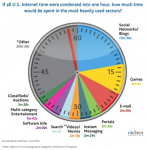 Dale Carnegie got it right in 1937 when he published the still-in-print “How to Win Friends and Influence People,” notes Lisa Buyer, writing on leading SEO industry trade site, Search Engine Watch. Carnegie’s simple six-point plan, below, is as relevant today, or even more so, given the rising prominence of social media sites in our public conversation.
Dale Carnegie got it right in 1937 when he published the still-in-print “How to Win Friends and Influence People,” notes Lisa Buyer, writing on leading SEO industry trade site, Search Engine Watch. Carnegie’s simple six-point plan, below, is as relevant today, or even more so, given the rising prominence of social media sites in our public conversation.
Twitter and Facebook, it seems, have turned the once impersonal Internet into a public forum, where Carnegie’s simple platitudes for getting along well with others are as relevant as ever.
Carnegie stressed the following points (updated to include tips for use by businesses on social media sites):
1. Become genuinely interested in other people. Your businesses should have accounts and/or pages on Facebook, Twitter and LinkedIn, at a minimum. And a people-friendly point person should be appointed to keep these pages updated.
2. Smile. Regardless of the material or response, it is always for the writing on your website and social media pages to be upbeat and lively. Nobody ‘likes’ a downer.
3. Remember that a person’s name is, to that person, the sweetest and most important sound in any language. ‘Likes’ and comments on Facebook, ‘@replies’ and ‘tags’ on Twitter and ‘comments’ on LinkedIn are all easy ways to have your client’s (or prospective client’s) name recognized, inculcating client loyalty.
4. Be a good listener. Encourage others to talk about themselves and their interests or concerns. Ask questions and invite social media users to leave comments. Follow up on all such questions and comments.
5. Talk in terms of the other person’s interest. Write copy and respond to users by keeping their interests, not yours, foremost in mind. Look for, and address, your common interests, and demonstrate how your products or services fill a need.
6. Make the other person feel important — and do it sincerely. Be sociable and interactive. Have your point person follow client events. Recognizing a birthday anniversary or holiday (particularly with personalized greetings and/or a special offer) are all excellent ways of reaching out and building client land brand loyalty.
Both Google and Bing continue to use social signals to help rank regular search results, Buyers notes. But, she cautions, while “winning friends and influencing people seems to be the name of the game when it comes to search marketing . . . like in real life, there is more to the equation.” For successful businesses, whether to have a social media marketing strategy is not the question. Rather, the question is what that marketing plan should include. Carnegie’s book, as Buyers points out, is certainly a primer for developing such a plan.
